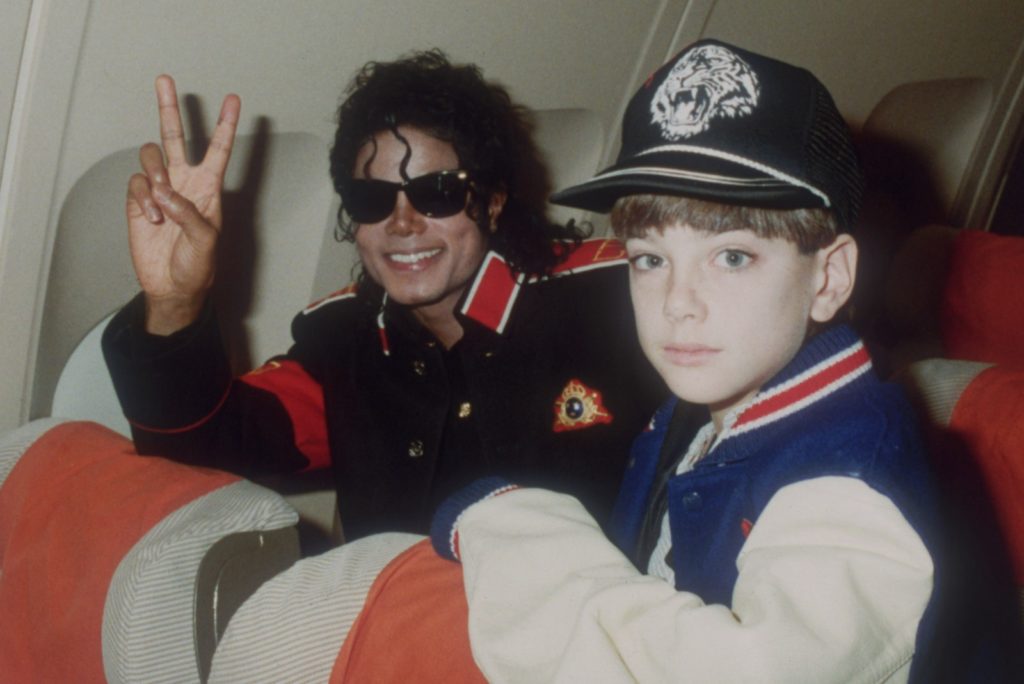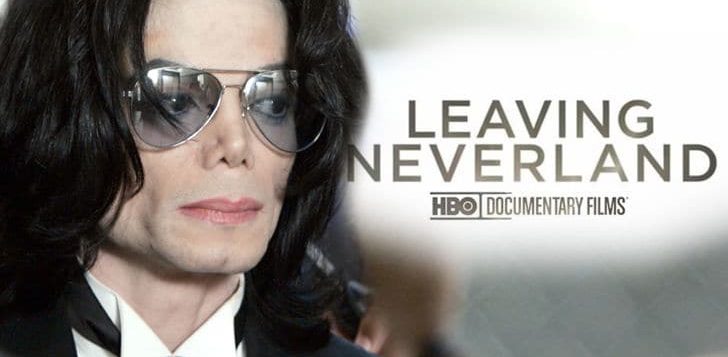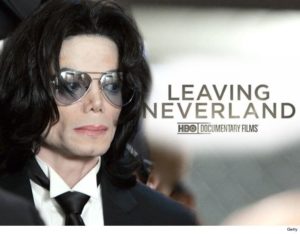EXACTLY FIFTY YEARS AGO, five young boys from Gary, Indiana, became pop music sensations. It has always been difficult separating the truth about their origin from myth because Motown Records chief Berry Gordy has always understood that turning artists into legends is not just a musical process but a narrative one as well. As the story goes, he was already jaded about the labor restrictions surrounding his first child star, Stevie Wonder. It was not in the company’s interest to hire more children. But talent scout Suzanne de Passe asked Gordy to give the kids a few minutes of his time. Thanks to footage preserved on YouTube, we can still see what Gordy saw, as a ten-year-old Michael Jackson does an imitation of James Brown that will give you chills.
Now, half a century after their first hit and a decade after Jackson’s death, fans are getting chills once more, this time inspired by a profoundly unflattering HBO documentary, Leaving Neverland. The four-hour study focuses on the lives of Wade Robson and James Safechuck, two men who are now reaching middle age and accuse the singer of having begun long-term sexual relationships with them in their childhood years. Both men describe growing up believing that their relationship was romantic and monogamous, and that their first sense of trauma was not the discovery that they were victims of sexual abuse, but, more poignantly, that their importance to Jackson was an illusion designed to gain their cooperation.
With such scathing subject matter, one would expect a filmmaker to recognize his or her evidentiary obligations, a subject to which this review will return presently. We have quite obviously reached a turning point in the history of sex-crime accusations. The current moment is heavily marked by an abrupt series of credible revelations about some of the most powerful members of our society and the best-loved vanguards of popular culture: Brett Kavanaugh, Harvey Weinstein, Bill Cosby, R. Kelly, Charlie Rose, Matt Lauer… the list goes on and on. The fact that politicians seem to escape justice when entertainers do not is beyond the immediate purview of this article. But in general, advocates for victims are sensitive to the overwhelming obstacles involved in coming out with such accusations and, as a result, have adopted the slogan “Believe the victims.” Ostensibly that means “Believe the accusers”; but the extraordinary problem that poses, aside from the folly of any form of belief in the absence of evidence, is the fact that there is such a thing as false accusation. Historically, the cry of rape from a white accuser toward a black suspect has been menacingly unreliable.

Into this context enters Jackson, a pop culture figure who seemed as an adult to be bent on erasing the physical signs of his blackness while never fully relinquishing the blackness of his music nor the loyalty of his black audience. Throughout his life, Jackson was endlessly marked by social awkwardness. He was associated romantically with a variety of women, even marrying two of them, while also being photographed escorting young boys and diminutive men to social functions. In his videos, he was rarely a convincing heterosexual suitor despite endless shots of his screaming teen girl fans, and even his album titles—Thriller, Bad, Dangerous, Invincible—read like attempts to convince us of his virility. These factors all matter profoundly, because Jackson’s whole career was built on convincing us to view him through an aspirational lens. And what African-American audiences in particular have aspired to see for generations is a man who broke all imaginable barriers and forced a racist industry to acknowledge his talent. In an era of fallen idols, the history of a people still rides partly on his shoulders.
For this reason, the plausibility of the documentary’s accusations needs to be scrutinized. It is undoubtedly tied to the cultural allegiances of its audiences and their historical memory, just as it was with the 1995 O.J. Simpson trial. This case is even more a palimpsest than Simpson’s because the evidence of sexual assault is less durable than that of murder. What’s more, the man accused in this case is no longer alive to defend himself. Which brings us back to the question of the film’s credibility or, more pointedly, its fairness. Director Dan Reed appears to have made almost no effort at fairness, seeking comment from none of Jackson’s allies. When asked why, Reed has claimed that the film is not about Jackson but about the victims. This is rather like saying that Psycho (1960) is not about Norman Bates but about the victims of his crimes. Reed’s dodge of his ethical responsibilities is frankly a disservice to all of Jackson’s survivors—both the children he raised who seem to remember him as a loving father, and the children he may have assaulted, whose accounts would be more credible if rigorously vetted.
Sadly, one must leave aside this film’s major sins of omission and consider the evidence that it does present, because the accusers are quite compelling. These young men did not grow up in complete obscurity. Thanks to Jackson’s fame, their proximity put them in the public eye. Robson met Jackson the same way Jackson met Gordy, as a child performer imitating his pop idol. Robson won a dance competition for which the prize was to meet Jackson, and his life was set on a course of near ruin. He was helped by Jackson into a career as a recording artist and then as a choreographer for Britney Spears and ’N Sync, heirs to the video industry that Jackson built almost singlehandedly.
Far from being a liability, Jackson’s fame appears to have allowed him to hunt for children in plain sight. On this point, it is not necessary to choose between one account of the past and another, because Jackson never disguised his desire to share his bed with unrelated children, although his defense of this practice hinged on the question of whether he slept next to them or at their feet. Also unambiguous is the fact that no adults can corroborate any given account because their parents acquiesced to this “dangerous” arrangement. Every significant memory of Robson and Safechuck is supported in the film—but never proven—with photographs, limited video footage, correspondence between the boys and Jackson, and extensive eyewitness accounts that, on the point of the sexual acts themselves, are always perilously incomplete unless coming from the two men.
The documentary is augmented by a live-to-tape fifth hour with Oprah Winfrey, whose own experience with sex abuse seems to predispose her to take all accusers at their word. But Winfrey’s skill as an interviewer offers remarkably useful moments of circumspection, as when she reveals to Robson his habit of externalizing his narrative by avoiding the first-person pronoun. She never wavers from the “believe the victims” ethos, but she also proves willing to ask probing questions that the documentary avoided. Among the revelations of her hour is the fact that the men blame their parents for being dazzled by Jackson and seduced by the lavish trips and celebrity encounters that were a routine part of Jackson’s life.
The documentary is tragic, riveting, and flawed. New challenges to its accounts have come out more recently, as construction documents reveal that a structure on Jackson’s property where Safechuck claims to have been abused in 1992 was only built in 1994. Perhaps part of giving potential victims a fair hearing should involve a nuanced acknowledgment that memory is porous, and that satellite inconsistencies don’t necessarily impeach the core account. But we appear not to live in a nuanced world; we live in a partisan world. And this documentary has chosen its side.
J. Ken Stuckey is a senior lecturer in English and media studies at Bentley University.






